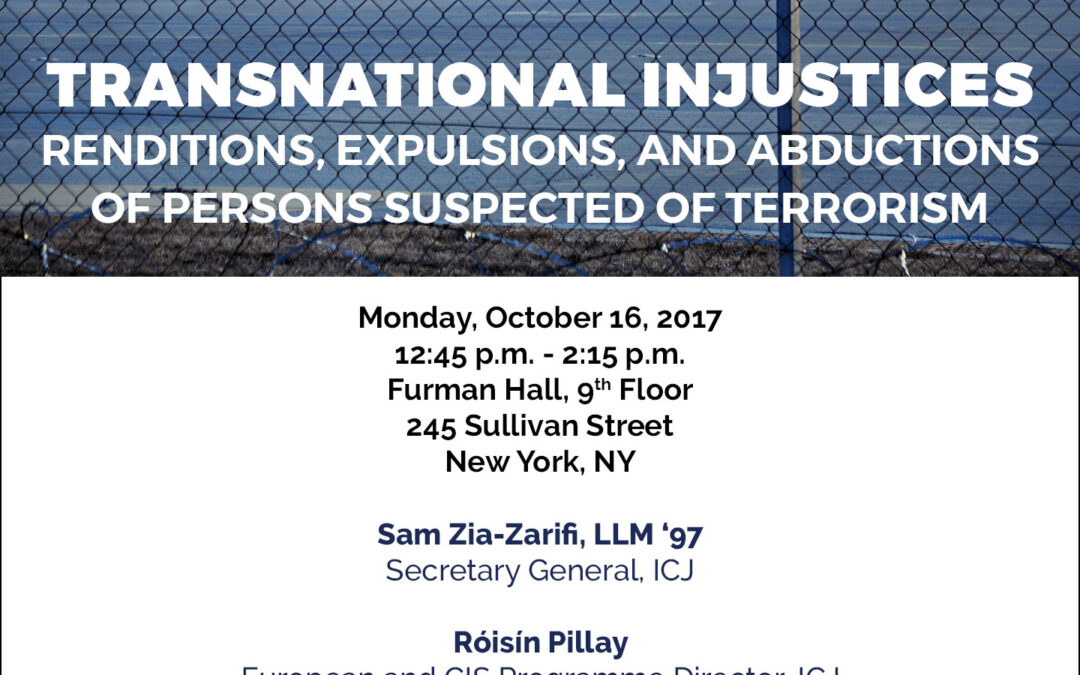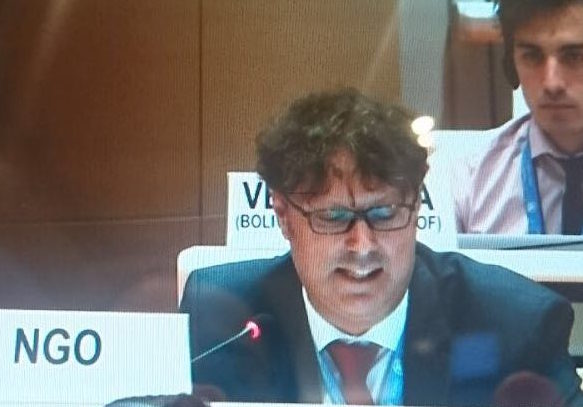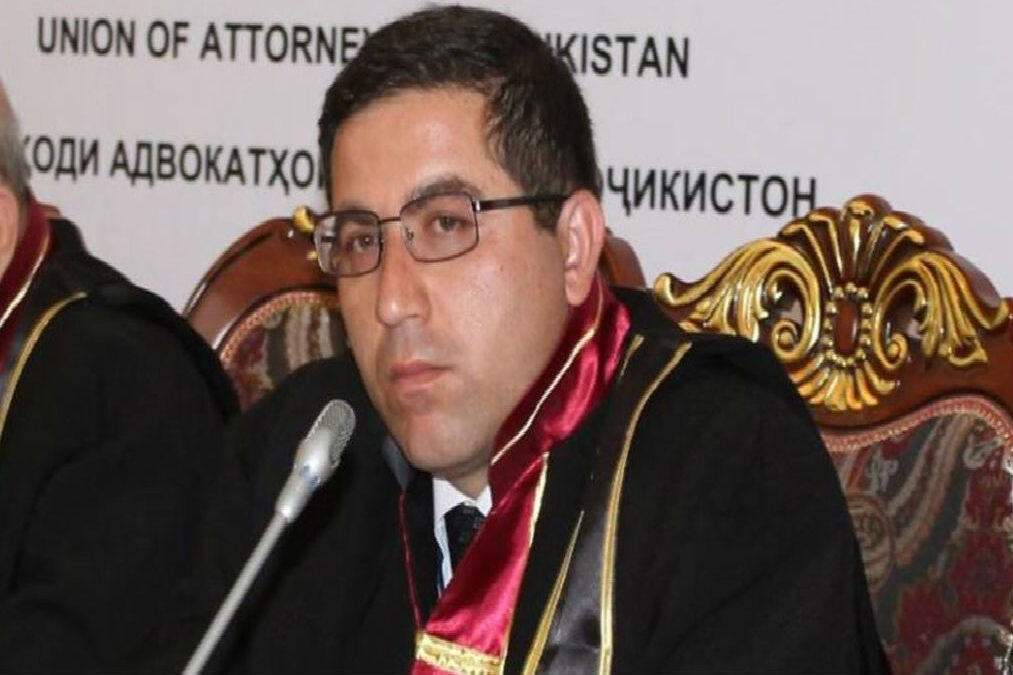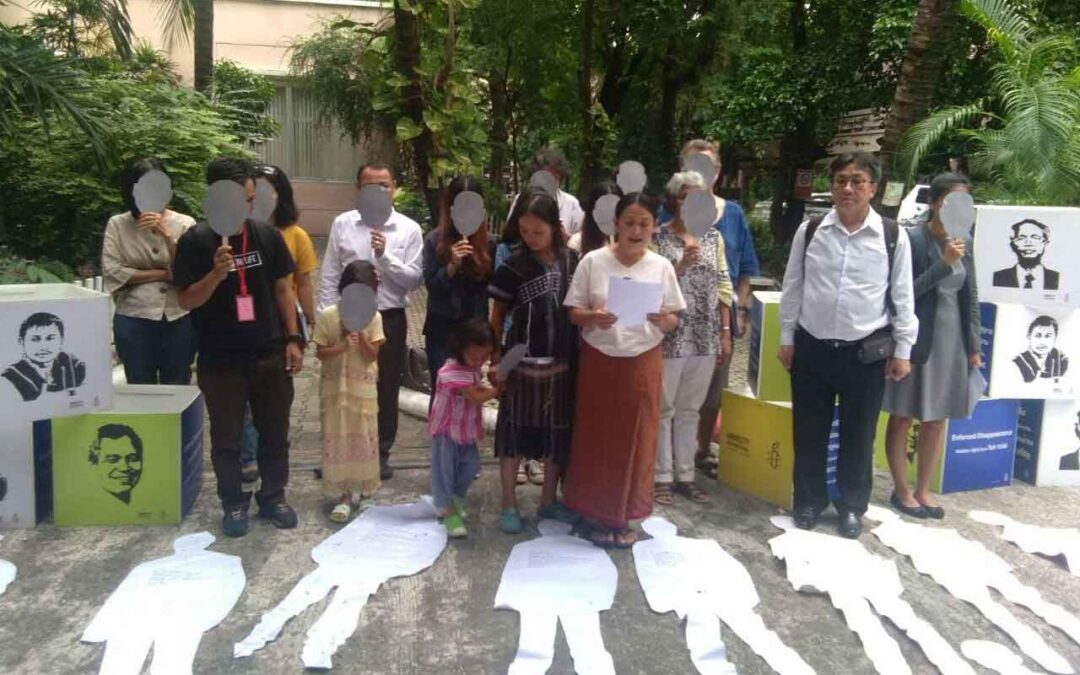
Oct 24, 2017 | News
Today the ICJ expressed its grave concern at the arrest and arbitrary detention of 13 Tanzanian human rights defenders and lawyers on charges that are incompatible with international legal obligations binding on Tanzania. The ICJ has called for their immediate release.
On 17 October 2017 13 human rights defenders, some of whom are lawyers, were arrested and detained in Tanzania after participating in a legal consultation aimed at considering legal challenges to the Tanzanian government’s ban on drop-in centres serving people at risk of HIV and a ban on the importation of water-based lubricants that are an essential HIV prevention tool.
Those 13 human rights defenders are all affiliated with the Initiative for Strategic Litigation in Southern Africa (ISLA) and Tanzanian organisation Community Health Services and Advocacy (CHESA).
Though they have not been charged, they appear to be under investigation for promoting homosexuality and in terms of section 154 of the Penal Code, which prohibits having ‘carnal knowledge of any person against the order of nature’.
To date 12 of the 13 remain in custody. After initially being granted bail by the Tanzanian police services, their bail was revoked without specified reason on 20 October 2017 and the 13 continue to face the real threat of criminal prosecution.
Instead of releasing the detained on bail, on 24 October the Tanzanian police services approached a Tanzanian court seeking an order granting them permission to perform ‘medical tests’ in the form of ‘forced anal tests’.
The police sought to perform these tests on the nine men who remain in detention. These invasive and demeaning tests appear to have been aimed at obtaining evidence for their criminal prosecution for performing sexual acts with other men.
If carried out non-consensually such exams violate the prohibition against torture and cruel, inhuman or degrading treatment.
The 13 charged under archaic colonial-era criminal laws that prohibit ‘carnal knowledge against the order of nature’, and which criminalize consensual sexual conduct between consenting males a sentence of ‘imprisonment for life and … for a term of not less than thirty years’, in contravention of international standards.
The laws, which are inherently abusive under any circumstance, do not even appear to be in any way applicable the 13 persons who were meeting for purposes of HIV prevention and promoting the right to health and the right to life.
The ICJ is concerned that arrests have been undertaken in contravention of rights protected under the Tanzanian Constitution and international law, including the International Covenant on Civil and Political Rights and the African Charter on Human and Peoples Rights, treaties to which Tanzania is party.
The protected rights include freedom of expression, the right to liberty, including freedom from arbitrary deprivation of liberty and the right to equal protection of the law; and the right to non-discrimination.
If they are carried out, any ‘forced anal tests’ would violate the right to be free from torture and cruel, inhuman or degrading treatment or punishment.
In addition, the ICJ has previously denounced such tests as evidentially and medically worthless.
Tanzanian authorities also appear to be attempting to use this prosecution to clamp down on the activities of civil society organizations.
The registration of CHESA has been suspended in what appears to be an attempt to halt its operations.
This amounts to a violation of the right to freedom of association, which is protected by the Tanzanian Constitution, the African Charter and the International Covenant on Civil and Political Rights.
The ICJ urges the authorities to drop the charges against these 13 human rights defenders. Pending revocation or dismissal of the charges, the 12 remaining detainees should in any event be immediately released.
The ICJ condemns the attempts of the Tanzanian police services to perform forced anal tests on male detainees, which constitute ill-treatment under international law, and urges the authorities to immediately desist from this course of action.
Contact:
Arnold Tsunga, ICJ Director of the Africa Regional Programme, t: +27716405926, e: arnold.tsunga(a)icj.org
Tanzania-Statement illegal detention-News-Web Stories-2017-ENG (full statement with additional information, in PDF)

Oct 9, 2017 | Events, News
The ICJ, the Center for Human Rights and Global Justice and Amnesty International invite you today to an event to discuss challenges in prevention of, and accountability for, violations of human rights in the US-led rendition system, and in transfers of suspects in the CIS region.
Join us for a moderated discussion marking the U.S. launch of the International Commission of Jurists’ report, Transnational Injustices: National Security Transfers and International Law.
Panelists will discuss the ongoing practice of states unlawfully rendering people accused of terrorism, particularly in Russia and Central Asia, and explore the extent to which the impact of the CIA’s notorious extraordinary renditions can still be felt today.
When: Monday, October 16, 2017 – 12:45 pm to 2:15 pm
Where: Lester Pollack Colloquium Room – Furman Hall, 9th Floor, NYU School of Law – 245 Sullivan Street, New York City
RSVP here
Refreshments will be served
Speakers:
- Sam Zia-Zarifi, Secretary General, ICJ
- Róisín Pillay, European and CIS Programme Director, ICJ
- Margaret Satterthwaite, JD ’99, Professor of Clinical Law, NYU School of Law
Moderated by Julia Hall, Expert on Counter-Terrorism and Human Rights, Amnesty International
A flyer for this event is available in PDF format by clicking here.

Oct 6, 2017 | Advocacy, Non-legal submissions
The ICJ today highlighted the role of judges, lawyers, and prosecutors at a UN seminar on prevention of torture in police custody and pre-trial detention.
The ICJ made the interventions during the “Seminar on the implementation of effective safeguards to prevent torture and other cruel, inhuman or degrading treatment or punishment during police custody and pre-trial detention” organized by the Office of the High Commissioner for Human Rights pursuant to a mandate from Human Rights Council resolution 31/31 (2016). A report of the seminar will be delivered and discussed at the March 2017 session of the Council.
The ICJ stated as follows in the first session:
The ICJ’s Commissioners are 60 senior judges and lawyers from all parts of the world. The ICJ works extensively with judges and absolutely agrees that their role is key to prevention of torture and ill-treatment in police custody and pre-trial detention.
Some of the key aspects of the role of judges include:
Judges should rigorously pursue all allegations. They should inquire when there are signs of abuse even if the detainee does not specifically allege abuse. They should demand that detainees be physically brought before them. Judges should be prepared to hold authorities in contempt of court when the authorities do not comply. The ICJ was very interested in what the Panelist Judge Dias Toffoli from Brazil said during the session about developments for custody hearings there, and how the judiciary can take practical systematic measures to fulfil their role even when legislators and other authorities may hesitate to act.
Judges should recognise and balance for evidentiary issues faced by detainees and their lawyers given the control authorities exercise over the place of detention
Judges should ensure that authorities respect rights of access to the outside world (including lawyers, family, friends, doctors, letters, and so on), both as safeguard but also to ensure detainees are not subjected to isolation that in its cumulative impact can itself amount to ill-treatment or even torture. The ICJ was pleased that Special Rapporteur Melzer highlighted the importance of such access.
Judges should ensure that confessions, other information and evidence obtained by torture and similar abuse is not allowed to be part of proceedings before them. The ICJ was interested in what justice Donoso from Chile said about relevant developments there.
In many places, judicial authorities are responsible for supervision of places of pre-trial detention. Where this is the case, judges should visit regularly, and at times without prior notice, such places of detention.
Judges should ensure accountability of perpetrators.
Judges should ensure rigorous constitutional review of relevant laws and practices, and maintain knowledge of and apply in practice international law against torture and ill-treatment. Even non-legally-binding international standards (such as the UN Standard Minimum Rules for the Treatment of Prisoners or “Mandela Rules”, and the UN Body of Principles for the protection of all persons under any form of detention or imprisonment) should be seen by judges as a useful and persuasive source of guidance in interpreting national laws.
To effectively fulfil their role, the judiciary must enjoy all necessary guarantees of independence from other authorities and other powerful interests in society. At the same time, at the ICJ we have also more recently been concerned to ensure accountability of judges when they fail to fulfil their duties to prevent and respond to torture, or are indeed intentionally complicit in mistreatment of prisoners.
Judges acting to protect human rights of criminal detainees are often subject to public criticism, and are often unable for reasons of impartiality and dignity of the court to defend themselves. It is therefore incumbent on members of the Executive, Legislature, legal profession, and others to defend such judges, and certainly not to pile on further unjustified criticism.
Finally, the ICJ would note that recent resolutions of the Human Rights Council on the independence of judges and lawyers, and on the administration of justice, stress the role of continuing professional education of judges on human rights issues (best organised by judicial institutions themselves, but involving other actors). Continuing education on prevention of torture and ill-treatment is a key area needed by all judiciaries in all countries.”
The ICJ continued as follows in the second session:
“A common thread that has already emerged from the first two panels is the role that pressure on police to obtain confessions plays in the incidence of torture and abuse in police custody. Thank you to the Panelists for their insights on this issue.
Values and signales from superiors and political leadership, including for instance in relation to practical aspects like career progression of police officials, is very important. Having clear rules is also very important in this regard. As is the perception of police that they lack alternatives to confessions as form of proof. Training on interviewing techniques, having an adequate number of officers, access to materials like fingerprinting kits and means of assuring chain-of-custody for physical evidence, are all also important.
The Seminar has addressed judges and police already, and will discuss lawyers later; the ICJ would also like to highlight the role of prosecutors in removing incentives on police to focus on obtaining confessions by any means.
The UN Guidelines on the Role of Prosecutors (Article 16) provide that prosecutors shall refuse to use evidence that they believe to have been obtained by torture.
A similar provision is incorporated in the professional standards adopted by the International Association of Prosecutors (which have also been endorsed by the UN Crime Commission). This also is an example of how international and regional professional associations can play an important role with their members in practical measures for prevention of torture and ill-treatment in police custody and pre-trial detention.”
In the third Session, the ICJ expressed its agreement with points made by Ms Miti-Drummond, the representative of the International Bar Association Human Rights Institute regarding the role of the legal profession in the prevention of torture, particularly regarding the importance of access to and presence of a competent and independent lawyer prior to and during any interview.
The ICJ also pointed out that some States have period of delay or even preclusion of access of detainee to the lawyer of his or her choosing, for instance in counter-terrorism, national security or similar cases. Often these are cases where there is a particular risk of abuse, and also may involve delay in bringing the person before a judge. In some places the independent bar association assigns a lawyer who has immediate access, if the access to the person’s lawyer of choice is denied or delayed. The ICJ invited comments or recommendations about this practice or other means to ensure lawyers can effectively prevent torture in such circumstances.

Oct 4, 2017 | News
Tajikistan should take urgent action to ensure the protection of Buzurgmehr Yorov, a lawyer serving a 28-year sentence in prison, following his conviction being based on clearly improper charges related to the defense of his clients, the ICJ said today.
The ICJ is aware that Bugurgmehr Yorov has been subjected to acts amounting to torture or other ill-treatment.
The responsible authorities must ensure that such ill-treatment immediately ceases and that allegations that Buzurgmehr Yorov’s rights that have been violated are promptly and thoroughly investigated by an independent body.
Anyone responsible for violations of his rights must be held accountable and brought to justice, as required under Tajikistan law as well as international human rights treaties to which Tajikistan is a party.
Buzurgmekhr Yorov was arrested two years ago on 28 September 2015, on charges of “fraud” and “forgery of documents.”
Later, he was accused of violating three more articles of the Criminal Code, including in relation to alleged “public calls for extremist activity.”
On 6 October 2016, The Dushanbe City Court sentenced Yorov to 23 years imprisonment in a strict regime prison.
In March this year, Yorov was sentenced to an additional two years’ deprivation of liberty for “contempt of court and insulting the representative of power.”
In August 2017, he received a further three years sentence on charges of “insulting the president.”
On 27 September 27 2017, Hurinniso Ishokova, mother of Buzurgmehr Yorov, obtained permission to visit her son in a pre-trial detention facility, for the first time in nine months.
Following the visit, she alleged that her son had been systematically beaten by prison staff during the whole period of his detention, and that in the last month the beatings had intensified.
She also said that at an unspecified time during his detention Buzurgmehr Yorov had been admitted to the hospital at the pre-trial facility.
After several days of treatment, he was again sent back and the beatings by prison staff resumed.
According to his mother, these beatings were accompanied by insults, humiliation and threats. Reportedly, on three recent occasions Buzurgmkhar Yorov was placed in a punishment cell for several days.
On September 28, 2017 the head of the pre-trial facility rejected all claims that Buzurgmkhar Yorov had been subjected to torture or other ill-treatment.
Background:
The ICJ has, on a number of occasions, expressed its serious concerns over the arrest and conviction of Buzurgmehr Yorov and other lawyers in Tajikistan.
The ICJ is concerned that Buzurgmehr Yorov’s conviction may constitute a reprisal for his defense work in high-profile political trials in connection with his representation of thirteen leaders of the Islamic Renaissance Party of Tajikistan (IRPT).
See:
https://www.icj.org/tajikistan-long-prison-sentences-for-lawyers-endangers-the-fairness-of-the-justice-system/
https://www.icj.org/tajikistan-arrest-of-lawyer-raises-concern-over-reprisals-for-defense-of-clients/
https://www.icj.org/tajikistan-icj-concerned-at-arrest-of-lawyer/
Tajikistan is a party to the International Covenant on Civil and Political Rights (ICCPR) and the UN Convention against Torture (CAT) both of which enshrine the absolute prohibition on torture or other cruel inhuman and degrading treatment, and require that allegations of such ill-treatment should be subject to independent, thorough and prompt investigation, and that perpetrators of crimes of torture should be brought to justice.
According to UN Basic Principles on the Role of Lawyers, lawyers “shall not suffer, or be threatened with, prosecution or administrative, economic or other sanctions for any action taken in accordance with recognized professional duties, standards and ethics.” (Principle 16(c)).
Yorov_statement_rus (Russian translation – pdf)

Aug 30, 2017 | News
On 30 August, the ICJ co-hosted an event in Bangkok, Thailand, named “International Day of the Victims of Enforced Disappearance: Human Rights Defenders & the Disappeared Justice”.
The event began with opening remarks by South-East Asia’s Regional Representative of the United Nations Office of the High Commissioner for Human Rights (OHCHR) Cynthia Veliko.
Thereafter, Kingsley Abbott, ICJ Senior International Legal Adviser, spoke in a panel discussion about enforced disappearances in Thailand, highlighting the need for Thailand to comply with its human rights obligations under international law.
This panel discussion also included Ms. Oranuch Phonpinyo, Community Representative, forensics expert Dr. Pornthip Rojanasunan and former National Human Rights Commissioner Dr. Niran Pitakwatchara.
In a second panel discussion held during the event, speakers included Ms. Phinnapha Phrueksaphan, Victim Representative, Ms. Angkhana Neelapaijit, National Human Rights Commissioner and Victim Representative, Ms. Nareeluc Pairchaiyapoom from Thailand’s Ministry of Justice and prominent human rights lawyer Mr. Somchai Homlaor.
The event focused on the lack of progress in Thailand with regard to investigating cases of apparent enforced disappearance and called for the Royal Thai government to amend and pass legislation criminalizing torture, ill-treatment and enforced disappearance without further delay.
Thailand is a State party to the International Covenant on Civil and Political Rights (ICCPR), the Convention against Torture and other Cruel, Inhuman or Degrading Treatment or Punishment (CAT) and has signed, but not yet ratified, the International Convention for the Protection of All Persons from Enforced Disappearance (ICPPED).
The other organizers of the event were OHCHR’s South-East Asia Regional Office, the Cross Cultural Foundation (CrCF), Human Rights Lawyers Association (HRLA), the Esaan Land Reform Network, Amnesty International Thailand, Thailand’s Ministry of Justice and the Association for the Prevention of Torture (APT).
Copies of an open letter sent by the ICJ and other human rights groups to the Royal Thai government on 30 August were distributed to the event’s participants.
Contact
Kingsley Abbott, ICJ Senior International Legal Adviser for Southeast Asia, kingsley.abbott(a)icj.org
See the full open letter here in English and Thai
Read also
Ten Years Without Truth: Somchai Neelapaijit and Enforced Disappearances in Thailand









